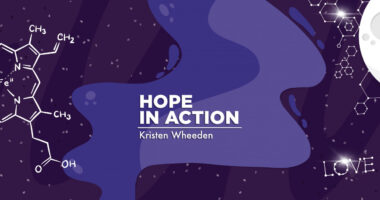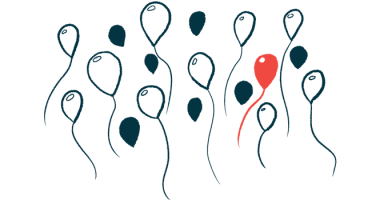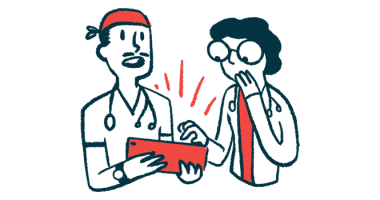There’s No Certificate of Completion for Rare Disease
A columnist weighs the side effects of Givlaari, and her never-ending condition

From the recliner in the chemotherapy suite, I desperately looked around the room for any place of interest to focus my vision. I needed a distraction from the nurse perched on a stool in front of me, probing my arm for a vein. I was dehydrated from a recent acute porphyria attack, and bruises from last week’s IV needle still showed on the soft flesh of my forearm, fluctuating like a mood ring, from a vibrant purple-blue to a dull shade of green-brown. This was the second nurse who tried to stick me; the first one hit a valve and undoubtedly contributed to my bruise collection.
Suddenly, a different nurse caught my eye. She excitedly ran up to a man and woman sitting across from me. They were young, perhaps a couple. The woman was in the recliner, receiving intravenous medications. In her early 30s, her body was covered by blankets, and on her head rested a soft-looking knit hat. The attentive man sitting next to her had a recently shaved head. I imagined him cutting all his hair in solidarity. Both of them perked up instantly as the nurse handed over a piece of paper.
“Congratulations,” she said softly, beaming.
The needle stuck and slid under my skin like a sharp intake of breath. My whole body tensed. My nurse had found a vein. I sucked in my lips and bit down, blinking, watching as the couple across from me smiled at each other, silently celebrating their final chemotherapy treatment. Soon, the tape was on, and the pinch in my arm turned into a dull flow of fluids.
I’ve lost count of the number of times I’ve seen someone get the certificate over the four years since I started receiving infusions. I’m happy for them, but I know that I’ll never receive one. The thought used to bother me. I’d brush it away, as if it were a fly. But it’d come buzzing back, along with a cocktail of annoying emotions — mostly anger and frustration, with a dash of envy and a sprinkle of resentment.
My denial looks like anger. I’ve been in denial for a long time.
I don’t want to admit how acute hepatic porphyria truly affects my life. It’s like that optimistic part of my brain, which wants things to be better, is making decisions. And it’s not doing me any favors.
I started Givlaari (givosiran) 16 months ago, and the monthly injection to prevent acute attacks hasn’t been going as planned. I’ve gone back and forth on whether to forgo the treatment, weighing side effects and benefits, but after the past couple months, I’m confident it’s time to move on.
My twice monthly attacks haven’t ever gone away; they’ve just been modified. I tracked my most recent attack and noticed two clear phases: two to three days of abdominal pain, then two to six days of utter exhaustion, muscle fatigue, and weakness that leave me pinned to my bed. I can’t attribute this pattern solely to Givlaari, though. All I know is it started with the treatment and has only gotten worse with the dose increase.
I needed a driver and my walker to get to my infusion that day, which meant I had to not only admit that I needed help, but also that I needed a mobility device. I received a walker after a hospitalization three years ago, but I can count on one hand the number of times I’ve swallowed my pride and used it outside my home.
I’ve wanted to be that person who only has a handful of attacks in her lifetime. I’ve wanted Givlaari to be the silver-bullet wonder drug it was once rumored to be in the porphyria patient community. Last Saturday at the movie theater, I wanted my legs to be stronger. I willed it.
I reasoned I could go to the nearly three-hour movie “Black Panther: Wakanda Forever” with my family, despite still being in the midst of my attack recovery. I didn’t bring a mobility device.
As the day played out, I relied on my partner’s help to walk, slept through a major plot point in the movie, and broke out in a hot sweat, nearly fainting with exhaustion when I couldn’t find a bench in the lobby. Maybe it was too early to leave my house, even for an activity that consisted mostly of sitting. But maybe I could’ve saved energy and had a much easier time if I’d just embraced the support of my trusty walker.
There’s no certificate of completion for rare disease and chronic illness. For now, I’m making a promise to myself: to remember each day that even if I struggle to accept the uncertainty in my life, I can at least make compassionate choices for myself.
Note: Porphyria News is strictly a news and information website about the disease. It does not provide medical advice, diagnosis, or treatment. This content is not intended to be a substitute for professional medical advice, diagnosis, or treatment. Always seek the advice of your physician or other qualified health provider with any questions you may have regarding a medical condition. Never disregard professional medical advice or delay in seeking it because of something you have read on this website. The opinions expressed in this column are not those of Porphyria News or its parent company, BioNews, and are intended to spark discussion about issues pertaining to porphyria.








Comments
Joni Welda
While there may be no Certificate Of Completion, there are daily Awards of Merit for getting through each and every day as best as we can with AHP. It’s the journey-not the destination.
Claire Richmond
Hi Joni- We can and SHOULD be celebrating each day we make it through! Thank you for reading.